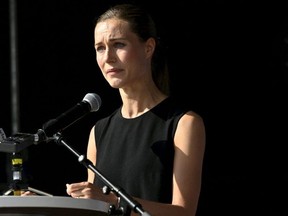VICTORIA – If the lead up to British Columbia‘s provincial election campaign is any indication of what’s to come, voters should expect the unexpected.
It could be a wild ride to voting day on Oct. 19.
The Conservative Party of B.C. that didn’t elect a single member in the last election and gained less than two per cent of the popular vote is now leading the charge for centre-right, anti-NDP voters.
The official Opposition BC United, who as the former B.C. Liberals won four consecutive majorities from 2001 to 2013, raised a white flag and suspended its campaign last month, asking its members, incumbents and voters to support the B.C. Conservatives to prevent a vote split on the political right.
New Democrat Leader David Eby delivered a few political surprises of his own in the days leading up to Saturday’s official campaign start, signalling major shifts on the carbon tax and the issue of involuntary care in an attempt to curb the deadly opioid overdose crisis.
He said the NDP would drop the province’s long-standing carbon tax for consumers if the federal government eliminates its requirement to keep the levy in place, and pledged to introduce involuntary care of people battling mental health and addiction issues.
The B.C. Coroners Service reports more than 15,000 overdose deaths since the province declared an opioid overdose public health emergency in 2016.
Drug policy in B.C., especially decriminalization of possession of small amounts of hard drugs and drug use in public areas, could become key election issues this fall.
Eby, a former executive director of the B.C. Civil Liberties Association, said Wednesday that criticism of the NDP’s involuntary care plan by the Canadian Civil Liberties Association is “misinformed” and “misleading.”
“This isn’t about forcing people into a particular treatment,” he said at an unrelated news conference. “This is about making sure that their safety, as well as the safety of the broader community, is looked after.”
Eby said “simplistic arguments,” where one side says lock people up and the other says don’t lock anybody up don’t make sense.
“There are some people who should be in jail, who belong in jail to ensure community safety,” said Eby. “There are some people who need to be in intensive, secure mental health treatment facilities because that’s what they need in order to be safe, in order not to be exploited, in order not to be dead.”
The CCLA said in a statement Eby’s plan is not acceptable.
“There is no doubt that substance use is an alarming and pressing epidemic,” said Anais Bussières McNicoll, the association’s fundamental freedoms program director. “This scourge is causing significant suffering, particularly, among vulnerable and marginalized groups. That being said, detaining people without even assessing their capacity to make treatment decisions, and forcing them to undergo treatment against their will, is unconstitutional.”
While Eby, a noted human rights lawyer, could face political pressure from civil rights opponents to his involuntary care plans, his opponents on the right also face difficulties.
The BC United Party suspended its campaign last month in a pre-election move to prevent a vote split on the right, but that support may splinter as former jilted United members run as Independents.
Five incumbent BC United MLAs, Mike Bernier, Dan Davies, Tom Shypitka, Karin Kirkpatrick and Coralee Oakes are running as Independents and could become power brokers in the event of a minority government situation, while former BC United incumbents Ian Paton, Peter Milobar and Trevor Halford are running under the B.C. Conservative banner.
Davies, who represents the Fort St. John area riding of Peace River North, said he’s always been a Conservative-leaning politician but he has deep community roots and was urged by his supporters to run as an Independent after the Conservatives nominated their own candidate.
Davies said he may be open to talking with B.C. Conservative Leader John Rustad after the election, if he wins or loses.
Green Leader Sonia Furstenau has suggested her party is an option for alienated BC United voters.
Rustad — who faced criticism from BC United Leader Kevin Falcon and Eby about the far-right and extremist views of some of his current and former candidates and advisers — said the party’s rise over the past months has been meteoric.
“It’s been almost 100 years since the Conservative Party in B.C. has won a government,” he said. “The last time was 1927. I look at this now and I think I have never seen this happen anywhere in the country before. This has been happening in just over a year. It just speaks volumes that people are just that eager and interested in change.”
Rustad, ejected from the former B.C. Liberals in August 2022 for publicly supporting a climate change skeptic, sat briefly as an Independent before being acclaimed the B.C. Conservative leader in March 2023.
Rustad, who said if elected he will fire B.C.’s provincial health officer Dr. Bonnie Henry over her vaccine mandates during the COVID-19 pandemic, has removed the nominations of some of his candidates who were vaccine opponents.
“I am not interested in going after votes and trying to do things that I think might be popular,” he said.
Prof. David Black, a political communications specialist at Greater Victoria’s Royal Roads University, said the rise of Rustad’s Conservatives and the collapse of BC United is the political story of the year in B.C.
But it’s still too early to gauge the strength of the Conservative wave, he said.
“Many questions remain,” said Black. “Has the free enterprise coalition shifted sufficiently far enough to the right to find the social conservatism and culture-war populism of some parts of the B.C. Conservative platform agreeable? Is a party that had no infrastructure and minimal presence in what are now 93 ridings this election able to scale up and run a professional campaign across the province?”
This report by The Canadian Press was first published Sept. 19, 2024.
